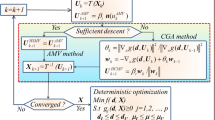Abstract
Single-loop approach (SLA) is an efficient reliability-based design optimization (RBDO) method, where the current most probable point (MPP) is located through the gradient information of previous MPP. However, the MPP obtained by SLA may not be accurate for complex nonlinear RBDO problems, which probably causes SLA to be inefficient, converge to the wrong optimal solution or even difficulty in convergence. In this study, an enriched single-loop approach based on enhanced advanced mean value (ESLA-EAMV) is proposed to improve convergence performance of the original SLA for complex nonlinear RBDO problems. First, an enhanced advanced mean value (EAMV) method is developed to find the MPP, where the negative gradient vector of the previous MPP in AMV is replaced by a vector with adaptive step size in EAMV. Then, the proposed EAMV method is integrated into the original SLA to improve the convergence ability of the original SLA. Finally, seven benchmark nonlinear problems are presented to verify the accuracy, efficiency and robustness of the proposed ESLA-MAMV compared with other existing RBDO methods. Comparison results show that the proposed ESLA-MAMV can improve the convergence performance of the original SLA.



Similar content being viewed by others
References
Jiang C, Hu Z, Liu Y, Mourelatos ZP, Jayakumar P (2020) A sequential calibration and validation framework for model uncertainty quantification and reduction. Comput Methods Appl Mech Eng 368:113172. https://doi.org/10.1016/j.cma.2020.113172
Liu J, Cao L, Jiang C, Ni B, Zhang D (2020) Parallelotope-formed evidence theory model for quantifying uncertainties with correlation. Appl Math Model 77:32–48. https://doi.org/10.1016/j.apm.2019.07.017
Zhang D, Han X (2020) Kinematic reliability analysis of robotic manipulator. J Mech Des 142(4):044502. https://doi.org/10.1115/1.4044436
Wu J, Zhang D, Liu J, Jia X, Han X (2020) A computational framework of kinematic accuracy reliability analysis for industrial robots. Appl Math Model 82:189–216. https://doi.org/10.1016/j.apm.2020.01.005
Zhang D, Zhang N, Ye N, Fang J, Han X (2021) A hybrid learning algorithm of radial basis function networks for reliability analysis. IEEE Trans Reliab. https://doi.org/10.1109/TR.2020.3001232
Yaseen ZM, Keshtegar B (2019) Limited descent-based mean value method for inverse reliability analysis. Eng Comput 35(4):1237–1249. https://doi.org/10.1007/s00366-018-0661-z
Wu J, Zhang D, Jiang C, Han X, Li Q (2021) On reliability analysis method through rotational sparse grid nodes. Mech Syst Signal Process 147:107106. https://doi.org/10.1016/j.ymssp.2020.107106
Meng Z, Zhang Z, Li G, Zhang D (2020) An active weight learning method for efficient reliability assessment with small failure probability. Struct Multidiscipl Optim 61(3):1157–1170. https://doi.org/10.1007/s00158-019-02419-z
Meng Z, Pu YX, Zhou HL (2018) Adaptive stability transformation method of chaos control for first order reliability method. Eng Comput 34(4):671–683. https://doi.org/10.1007/s00366-017-0566-2
Keshtegar B (2018) Enriched FR conjugate search directions for robust and efficient structural reliability analysis. Eng Comput 34(1):117–128. https://doi.org/10.1007/s00366-017-0524-z
Arab HG, Rashki M, Rostamian M, Ghavidel A, Shahraki H, Keshtegar B (2019) Refined first-order reliability method using cross-entropy optimization method. Eng Comput 35(4):1507–1519. https://doi.org/10.1007/s00366-018-0680-9
Tu J, Choi KK, Park YH (1999) A new study on reliability-based design optimization. J Mech Des 121(4):557–564. https://doi.org/10.1115/1.2829499
Youn BD, Choi KK (2004a) An investigation of nonlinearity of reliability-based design optimization approaches. J Mech Des 126(3):403–411. https://doi.org/10.1115/1.1701880
Wu YT, Millwater H, Cruse TA (1990) Advanced probabilistic structural analysis method for implicit performance functions. AIAA J 28(9):1663–1669. https://doi.org/10.2514/3.25266
Yang D, Yi P (2009) Chaos control of performance measure approach for evaluation of probabilistic constraints. Struct Multidiscipl Optim 38(1):83–92. https://doi.org/10.1007/s00158-008-0270-3
Ezzati G, Mammadov M, Kulkarni S (2015) A new reliability analysis method based on the conjugate gradient direction. Struct Multidiscipl Optim 51(1):89–98. https://doi.org/10.1007/s00158-014-1113-z
Youn BD, Choi KK, Park YH (2003) Hybrid analysis method for reliability-based design optimization. J Mech Des 125(2):221–232. https://doi.org/10.1115/1.1561042
Meng Z, Li G, Wang BP, Hao P (2015) A hybrid chaos control approach of the performance measure functions for reliability-based design optimization. Comput Struct 146:32–43. https://doi.org/10.1016/j.compstruc.2014.08.011
Keshtegar B, Baharom S, Elshafie A (2018) Self-adaptive conjugate method for a robust and efficient performance measure approach for reliability-based design optimization. Eng Comput 34(1):187–202. https://doi.org/10.1007/s00366-017-0529-7
Wu YT, Shin Y, Sues R, Cesare M (2001) Safety-factor based approach for probability-based design optimization. In: 19th AIAA applied aerodynamics conference, 2001. https://doi.org/10.2514/6.2001-1522
Du X, Chen W (2004) Sequential optimization and reliability assessment method for efficient probabilistic design. J Mech Des 126(2):225–233. https://doi.org/10.1115/1.1649968
Cheng G, Xu L, Jiang L (2006) A sequential approximate programming strategy for reliability-based structural optimization. Comput Struct 84(21):1353–1367. https://doi.org/10.1016/j.compstruc.2006.03.006
Zou T, Mahadevan S (2006) A direct decoupling approach for efficient reliability-based design optimization. Struct Multidiscipl Optim 31(3):190–200. https://doi.org/10.1007/s00158-005-0572-7
Yang R, Gu L (2004) Experience with approximate reliability-based optimization methods. Struct Multidiscipl Optim 26(1):152–159. https://doi.org/10.1007/s00158-003-0319-2
Aoues Y, Chateauneuf A (2010) Benchmark study of numerical methods for reliability-based design optimization. Struct Multidiscipl Optim 41(2):277–294. https://doi.org/10.1007/s00158-009-0412-2
Lopez RH, Beck AT (2012) Reliability-based design optimization strategies based on FORM: a review. J Braz Soc Mech Sci Eng 34(4):506–514. https://doi.org/10.1590/S1678-58782012000400012
Du X (2008) Saddlepoint approximation for sequential optimization and reliability analysis. J Mech Des 130(1):011011. https://doi.org/10.1115/1.2717225
Cho TM, Lee BC (2011) Reliability-based design optimization using convex linearization and sequential optimization and reliability assessment method. Struct Saf 33(1):42–50. https://doi.org/10.1016/j.strusafe.2010.05.003
Chen Z, Qiu H, Gao L, Su L, Li P (2013) An adaptive decoupling approach for reliability-based design optimization. Comput Struct 117:58–66. https://doi.org/10.1016/j.compstruc.2012.12.001
Yi P, Zhu Z, Gong J (2016) An approximate sequential optimization and reliability assessment method for reliability-based design optimization. Struct Multidiscipl Optim 54(6):1367–1378. https://doi.org/10.1007/s00158-016-1478-2
Chen Z, Li X, Chen G, Gao L, Qiu H, Wang S (2018) A probabilistic feasible region approach for reliability-based design optimization. Struct Multidiscipl Optim 57(1):359–372. https://doi.org/10.1007/s00158-017-1759-4
Chen Z, Qiu H, Gao L, Li P (2013) An optimal shifting vector approach for efficient probabilistic design. Struct Multidiscipl Optim 47(6):905–920. https://doi.org/10.1007/s00158-012-0873-6
Huang Z, Jiang C, Zhou YS, Luo Z, Zhang Z (2016) An incremental shifting vector approach for reliability-based design optimization. Struct Multidiscipl Optim 53(3):523–543. https://doi.org/10.1007/s00158-015-1352-7
Torii AJ, Lopez RH, Miguel LFF (2016) A general RBDO decoupling approach for different reliability analysis methods. Struct Multidiscipl Optim 54(2):317–332. https://doi.org/10.1007/s00158-016-1408-3
Chen X, Hasselman T, Neill D (1997) Reliability based structural design optimization for practical applications. In: Structures, structural dynamics and materials conference, 1997. https://doi.org/10.2514/6.1997-1403
Liang J, Mourelatos ZP, Tu J (2004) A single-loop method for reliability-based design optimization. In: design automation conference, 2004, pp 419–430. https://doi.org/10.1504/IJPD.2008.016371
Shan S, Wang GG (2008) Reliable design space and complete single-loop reliability-based design optimization. Reliab Eng Syst Saf 93(8):1218–1230. https://doi.org/10.1016/j.ress.2007.07.006
Kogiso N, Yang Y, Kim B, Lee J (2012) Modified single-loop-single-vector method for efficient reliability-based design optimization. J Adv Mech Design Syst Manuf 6(7):1206–1221. https://doi.org/10.1299/jamdsm.6.1206
Jeong S, Park G (2017) Single loop single vector approach using the conjugate gradient in reliability based design optimization. Struct Multidiscipl Optim 55(4):1329–1344. https://doi.org/10.1007/s00158-016-1580-5
Lind PN, Olsson M (2019) Augmented single loop single vector algorithm using nonlinear approximations of constraints in reliability-based design optimization. J Mech Des 141(10):101403. https://doi.org/10.1115/1.4043679
Jiang C, Qiu H, Gao L, Cai X, Li P (2017) An adaptive hybrid single-loop method for reliability-based design optimization using iterative control strategy. Struct Multidiscipl Optim 56(6):1271–1286. https://doi.org/10.1007/s00158-017-1719-z
Zhou M, Luo Z, Yi P, Cheng G (2018) A two-phase approach based on sequential approximation for reliability-based design optimization. Struct Multidiscipl Optim 57(2):489–508. https://doi.org/10.1007/s00158-017-1888-9
Meng Z, Keshtegar B (2019) Adaptive conjugate single-loop method for efficient reliability-based design and topology optimization. Comput Methods Appl Mech Eng 344:95–119. https://doi.org/10.1016/j.cma.2018.10.009
Keshtegar B, Hao P (2018) Enhanced single-loop method for efficient reliability-based design optimization with complex constraints. Struct Multidiscipl Optim 57(4):1731–1747. https://doi.org/10.1007/s00158-017-1842-x
Meng Z, Yang D, Zhou H, Wang BP (2018) Convergence control of single loop approach for reliability-based design optimization. Struct Multidiscipl Optim 57(3):1079–1091. https://doi.org/10.1007/s00158-017-1796-z
Li X, Meng Z, Chen G, Yang D (2019) A hybrid self-adjusted single-loop approach for reliability-based design optimization. Struct Multidiscipl Optim 60(5):1867–1885. https://doi.org/10.1007/s00158-019-02291-x
Keshtegar B, Hao P (2016) A Hybrid loop approach using the sufficient descent condition for accurate, robust, and efficient reliability-based design optimization. J Mech Des 138(12):121401. https://doi.org/10.1115/1.4034173
Jiang C, Qiu H, Li X, Chen Z, Gao L, Li P (2020) Iterative reliable design space approach for efficient reliability-based design optimization. Eng Comput 36(1):151–169. https://doi.org/10.1007/s00366-018-00691-z
Rackwitz R, Flessler B (1978) Structural reliability under combined random load sequences. Comput Struct 9(5):489–494. https://doi.org/10.1016/0045-7949(78)90046-9
Der Kiureghian A, Lin H, Hwang S (1987) Second-order reliability approximations. J Eng Mech 113(8):1208–1225. https://doi.org/10.1061/(ASCE)0733-9399(1987)113:8(1208)
Liu X, Wang X, Xie J, Li B (2020) Construction of probability box model based on maximum entropy principle and corresponding hybrid reliability analysis approach. Struct Multidiscipl Optim 61(2):1–19. https://doi.org/10.1007/s00158-019-02382-9
Hao P, Ma R, Wang Y, Feng S, Wang B, Li G, Xing H, Yang F (2019) An augmented step size adjustment method for the performance measure approach: toward general structural reliability-based design optimization. Struct Saf 80:32–45. https://doi.org/10.1016/j.strusafe.2019.04.001
Yang M, Zhang D, Han X (2020) New efficient and robust method for structural reliability analysis and its application in reliability-based design optimization. Comput Methods Appl Mech Eng 366:113018. https://doi.org/10.1016/j.cma.2020.113018
Youn BD, Choi KK (2004b) An investigation of nonlinearity of reliability-based design optimization approaches. J Mech Design 126(3):403–411. https://doi.org/10.1115/1.1701880
Wang Y, Hao P, Guo Z, Liu D, Gao Q (2020) Reliability-based design optimization of complex problems with multiple design points via narrowed search region. J Mech Design. https://doi.org/10.1115/1.4045420
Yang D, Xiao H (2013) Stability analysis and convergence control of iterative algorithms for reliability analysis and design optimization. J Mech Des 135(3):034501. https://doi.org/10.1115/1.4023327
Zhu S, Keshtegar B, Trung N, Yaseen ZM, Bui DT (2019) Reliability-based structural design optimization: hybridized conjugate mean value approach. Eng Comput. https://doi.org/10.1007/s00366-019-00829-7
Youn BD, Choi KK, Yang R, Gu L (2004) Reliability-based design optimization for crashworthiness of vehicle side impact. Struct Multidiscipl Optim 26(3):272–283. https://doi.org/10.1007/s00158-003-0345-0
Acknowledgements
The authors would like to greatly appreciate the financial support provided by the National Key R&D Program of China (Grant no. 2017YFB1301300), the National Natural Science Foundation of China (Grant no. 51905146), the Foundation for Innovative Research Groups of the National Natural Science Foundation of China (Grant no. 51621004), the Key R&D Plan Program of Hebei Province (Grant no. 19211808D) and the Natural Science Foundation of Hebei Province (Grant no. E2020202066).
Author information
Authors and Affiliations
Corresponding authors
Ethics declarations
Conflict of interest
The authors declare that they have no conflict of interest.
Additional information
Publisher's Note
Springer Nature remains neutral with regard to jurisdictional claims in published maps and institutional affiliations.
Rights and permissions
About this article
Cite this article
Yang, M., Zhang, D. & Han, X. Enriched single-loop approach for reliability-based design optimization of complex nonlinear problems. Engineering with Computers 38, 2431–2449 (2022). https://doi.org/10.1007/s00366-020-01198-2
Received:
Accepted:
Published:
Issue Date:
DOI: https://doi.org/10.1007/s00366-020-01198-2




